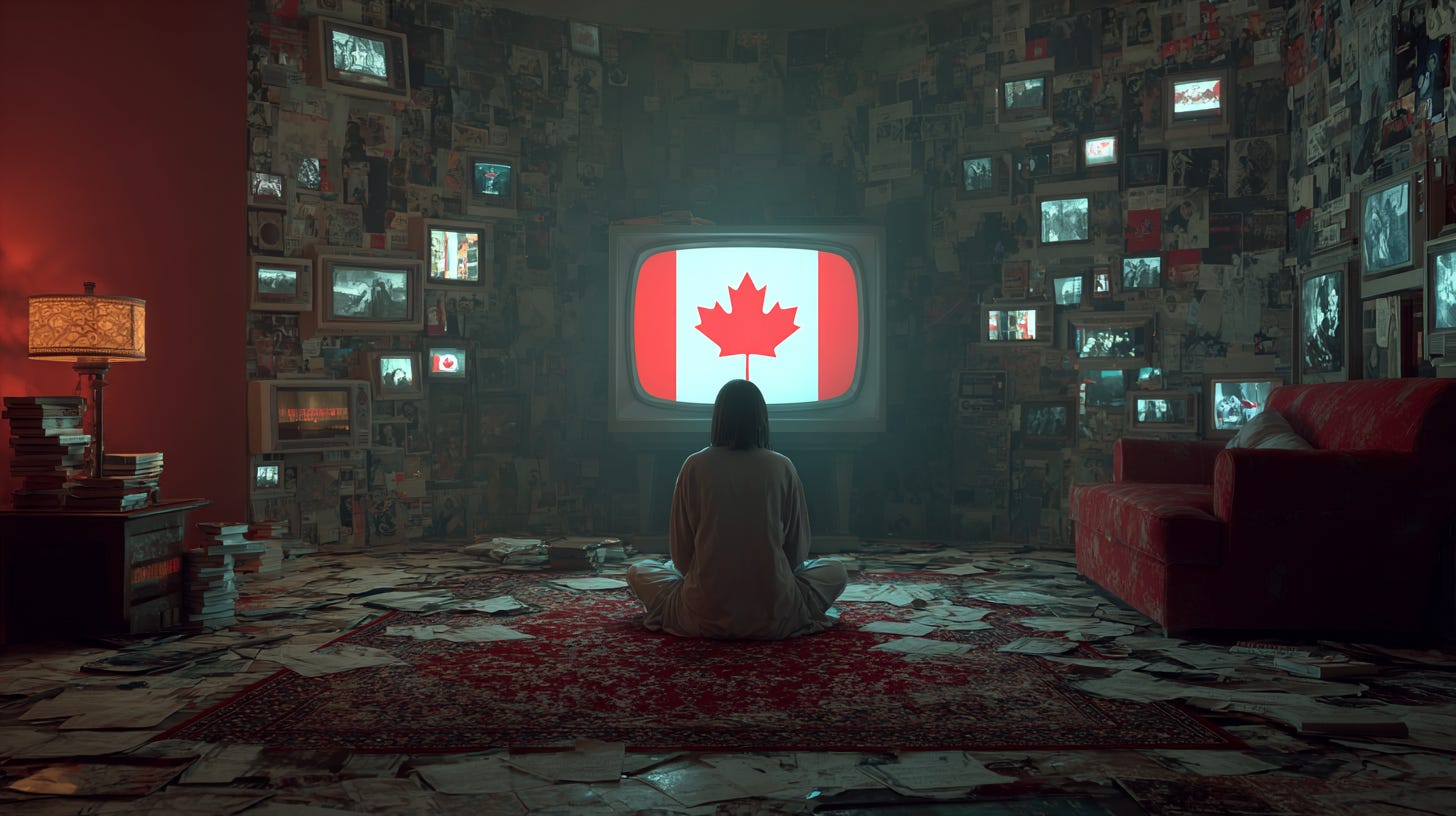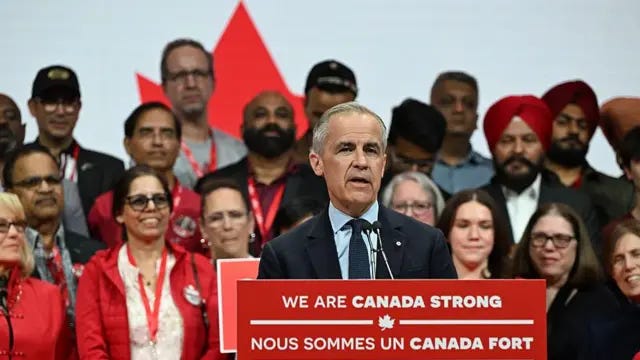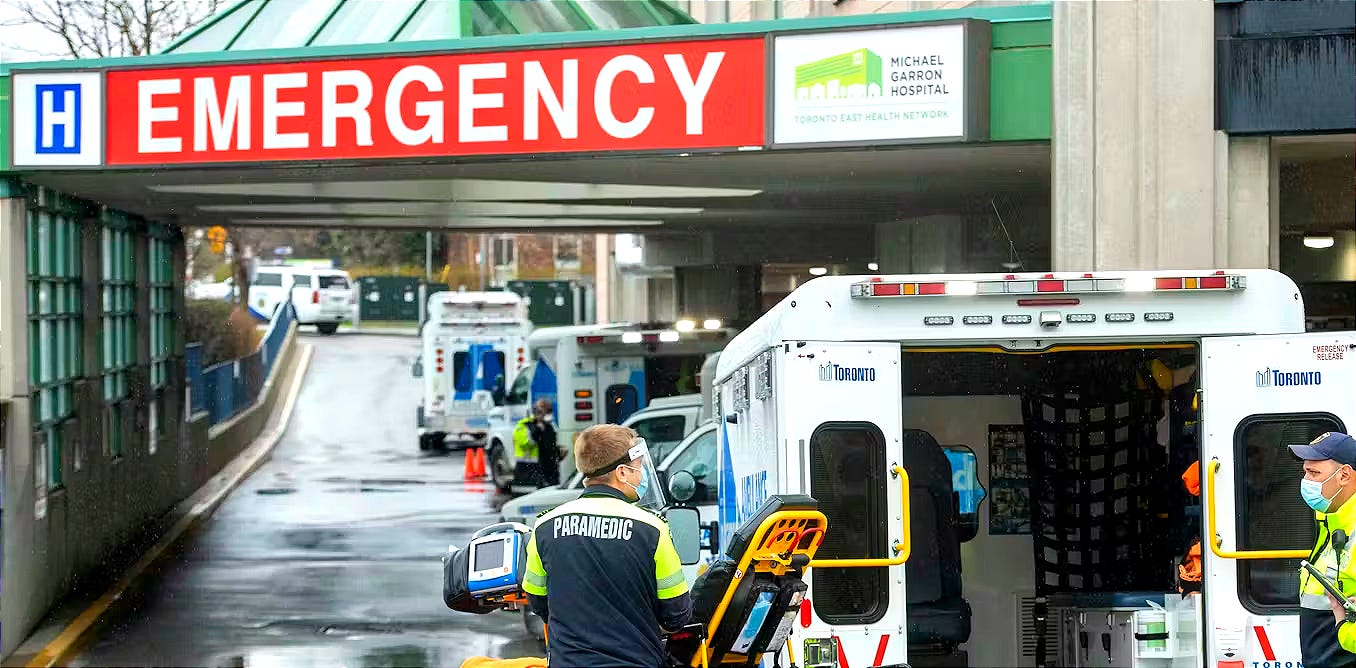Good morning, it’s Tuesday, November 18th. In today’s news, Ottawa has been socially engineering citizens with militarized propaganda, the Liberal government’s budget passes a confidence vote, Carney claims Toronto is “the best of Canada” because half of its residents weren’t born here, Chinese hackers are using AI to attack organizations, and much more.
First time reading the daily blend? Sign up here.
The Great Canadian PSYOP: How Ottawa Socially Engineered Citizens With Militarized Propaganda
The Justice Centre’s new report shows something Canadians were never meant to see: during COVID, the federal government wasn’t informing the public. It was running psychological operations on the public. In plain terms: brainwashing. A state-run effort to shape belief, mood, and behaviour—and it didn’t end when the pandemic did.
Inside the Privy Council Office sits a behavioural unit whose job is not to listen to Canadians, but to train them. The Impact and Innovation Unit was sold as a harmless “nudge” shop. In truth, it became a social-engineering arm of the federal government. Its work was not public health but compliance.
During the pandemic, this unit tested fake news stories about vaccine injuries, then observed which emotional cues pushed people away from fear and toward obedience. They mixed fear, reassurance, expert praise, and warm words about “community protection,” then measured which blend bent the public will the fastest. They called it the “kitchen sink” method.
This is better described as behavioural conditioning rather than “persuasion.”
And they launched it before they had solid safety data, while reports of myocarditis were already building. Instead of slowing down and telling the truth, Ottawa gave its behavioural team a new task: keep anxiety low, keep uptake high, and drown the public in cues that steer thought in the right direction.
This is how a government acts when it no longer sees citizens as thinking adults. It sees them as empty vessels waiting to be filled. It sees them as objects to be shaped.
We must recognize that this is the logic of a totalitarian regime.
A free country does not direct the inner life of its people. It does not hire psychologists to test which mood cues best override doubt. It does not treat its own citizens like subjects in a lab. But that is exactly what the federal government did.
Canadians were never given a chance to think for themselves because Ottawa had already decided their thoughts for them. And when a government believes it has the right to design the public mind, it has already left the democratic path.
The Justice Centre calls for oversight. That matters. But the deeper issue is this: a country cannot claim to be free when its leaders believe the people must be engineered. A country cannot claim to respect rights when it uses psy-ops against its own.
The government must stop treating the public as raw material.
‘Liberal Government’s Budget Passes Confidence Vote, Avoiding Christmas Election
The Liberal government narrowly survived a confidence vote on Budget 2025 in the House of Commons on November 17, passing 170–168. The vote included support from all Liberal MPs and Green Party Leader Elizabeth May, while all Bloc Québécois MPs and most Conservative and NDP MPs voted against it. A small number of MPs from the NDP (Gord Johns and Lori Idlout) and Conservatives (Shannon Stubbs and Matt Jeneroux) abstained, citing constituency considerations or personal circumstances.
The budget, tabled on November 4, projects a $78.3-billion deficit this fiscal year and includes billions in new spending aimed at boosting the economy amid U.S. tariffs, alongside savings such as cuts to the public service and foreign aid. Critics, including the Conservative Party, argue the budget overspends, adds unsustainable debt, and fails to reduce taxes, such as the industrial carbon tax. The Bloc Québécois opposed the budget due to unmet demands, including higher Old Age Security payments and increased health transfers to provinces.
Even some NDP MPs abstained, with Interim Leader Peter Davies framing the decision as avoiding another election while maintaining opposition to the budget’s policies. Conservative Leader Pierre Poilievre warned the budget treats government finances like a “credit card with no limits,” which he says will drive up costs for Canadians.
The interim Parliamentary Budget Officer, Jason Jacques, criticized the Liberals’ reliance on an “overly expansive” definition of capital investments, warning that a stricter definition would show Ottawa cannot meet its promise to balance operational spending by 2028–29. Analysts say the vote shows the Liberals are continuing their high-spending, debt-heavy approach despite warnings that Canada’s fiscal trajectory is unsustainable.
Prime Minister Mark Carney defended the budget as a “generational investment” that will protect communities, empower Canadians, and grow the economy, claiming wages are rising faster than inflation despite opposition criticism. Critics view the passage as business as usual for a government prioritizing spending and political optics over long-term fiscal stability, leaving Canadians to bear the consequences of mounting deficits and debt.
Mark Carney Says Toronto Is “The Best of Canada.” His Reason Should Worry You
Mark Carney says Toronto is “the best of Canada.” Not because it is a hub of business, culture, or capital. Not because it once stood as a symbol of Canadian grit and drive. Instead, he points to one fact: nearly half the people in the Greater Toronto Area were born somewhere else. That, to him, is what makes the city great.
Pause on that. Our prime minister thinks the mark of a strong nation is how few of its citizens were actually born in it.
Carney’s line was wrapped in the soft language Canadians have been trained to applaud. “You wouldn’t know because they quickly become Canadian. We’re enriched by them.” He said Toronto reflects “all of Canada in one place.” It was the usual pitch: Canada has no core, no roots, no shared story beyond being a landing pad for newcomers. But beneath the warm gloss sits a harsher truth. When the ruling class praises a country for how little of it remains itself, what they are really praising is its erasure.
The claim Toronto’s worth lies in the fact that half its residents were born abroad reveals the mindset now driving federal policy. It treats the country not as a nation but as a demographic spreadsheet. Culture is reduced to intake numbers. Growth is reduced to sheer headcount. Stability is replaced with churn. A common homeland is replaced with a permanent flow of strangers told to blend in before they can ask questions.
And when Carney says this model is “the genius of Canada,” he is not describing a natural process. He is describing a political project. Ottawa has spent years driving historic levels of immigration without building the homes, clinics, or schools needed to sustain it. It has turned cities into pressure cookers while telling citizens they should feel “enriched” as their wages fall, their rent climbs, and their trust frays. When people raise concerns, they are scolded, as if wanting a stable country is a moral flaw.
A nation is not “the best of itself” when it forgets itself. And Canada is not stronger when its leaders celebrate the idea that Canadians are an afterthought in their own story. Source.
Anthropic Says Chinese Hackers Used AI to Attack 30 Organizations
Anthropic, the AI company behind the Claude chatbot, reported that Chinese state-sponsored actors used its Claude Code tool to conduct automated cyberattacks on 30 global targets, including government agencies, tech and financial firms, and chemical manufacturers. The AI performed 80–90% of the attack work, writing its own exploitation code, harvesting credentials, and exfiltrating data with minimal human involvement. Anthropic said the attacks were only possible due to rapid AI advancements and warned that similar state-backed AI-enabled cyberattacks are likely in the future. More
60 Percent of Canadians Back Health-Care Reforms, Including Private Clinics
A new survey of over 1,600 Canadians by SecondStreet.org and Leger finds strong support for public health-care reform. Nearly six in 10 (59%) back government funding for private clinics to reduce wait times, with support highest among older Canadians, women, and Quebec residents (68%). Similarly, 59% support maintaining the public system while allowing patients to pay out-of-pocket or use extended health insurance for faster access—in other words, a private-public hybrid healthcare model.
Other reforms also drew majority support: 56% favour paying hospitals per service delivered, matching the complexity of care, and 50% support government financial incentives to encourage healthy living. Canadians remain largely opposed to user fees, with 55% rejecting even small charges for doctor visits. Overall, the survey shows a majority favour expanding patient choice and efficiency in Canada’s health system. More
Poland Says Explosive Device Detonated on Train Route Between Warsaw and Ukraine Border an ‘Unprecedented Act of Sabotage’ - More
UN Security Council Approves US Plan for Gaza Stabilization Force - In response, Hamas rejected the presence of foreign military personnel in Gaza, saying it would be exchanging Israeli occupation for “foreign guardianship.” More
UK Proposes New Asylum Policy with 20-Year Wait and Asset Seizures to Help Cover Processing Costs - More
Bangladesh Court Sentences Ousted PM Sheikh Hasina to Death for Crimes Against Humanity After Deadly Student Protests - More
Gunmen Abduct 25 Girls From a High School in Northwestern Nigeria and Kill the Vice Principal - More
Police: Two Arrested Following More Than 300 Grave Thefts in Southern Ontario - More
Interim PBO Jason Jacques Says He Will Apply for Permanent Position
Interim Parliamentary Budget Officer Jason Jacques has announced he will apply for the permanent PBO position. Appointed in September after Yves Giroux’s term ended, Jacques has 17 years of experience on Parliament Hill and emphasizes his ability to work tactfully across parties.
Since taking the role, Jacques has issued blunt assessments of the Liberal government’s finances, warning that rising deficits and a climbing debt-to-GDP ratio make Canada’s fiscal trajectory “unsustainable.” His recent reports highlighted an “overly expansive” definition of capital spending that inflates government claims and projected that Ottawa will not meet its promise to balance operational spending by 2028–29.
While the Conservative Party has called for Jacques to receive a full seven-year term, his critical reports make it unlikely the Liberal government will favour his permanent appointment. Parliament will ultimately decide who fills the role, with Jacques saying he will support whoever is chosen. More
Inflation Rate Ticks Down to 2.2% in October, Mostly Due to Falling Gas Prices - Excluding gas, inflation came in at 2.6%, the same as September. More
Bitcoin Plunges 25% to $95,000—Erasing All 2025 Gains - More
Jeff Bezos Becomes Co-CEO of $6.2 Billion AI Startup Project Prometheus - More
AI Detects Life Signs in 3.3 Billion-Year-Old Rocks
Scientists have found chemical evidence of life in rocks over 3.3 billion years old, pushing back the timeline for life on Earth and suggesting oxygen-producing photosynthesis began nearly a billion years earlier than previously thought. Using AI-driven chemical analysis, researchers detected subtle molecular “fingerprints” left by ancient organisms in rocks where traditional fossils or biomolecules had long vanished. This breakthrough not only rewrites Earth’s early biosphere timeline but also provides a powerful new method for searching for life on other planets. More
New Research Shows Neanderthals Never Vanished—They Became Modern Humans - New research suggests Neanderthals didn’t actually die out—they were slowly absorbed into Homo sapiens through thousands of years of “romantic collaboration.” More
Wolves in Canada Spotted Using Line to Pull Up Crab Traps in First Possible Use of Tools By the Species - More
Jake Paul to Face Former Heavyweight Champ Anthony Joshua in December
Netflix has announced that Jake Paul (12–1) will now fight former heavyweight champion Anthony Joshua (28–4) on December 19th at Miami’s Kaseya Center, replacing Paul’s canceled bout with Gervonta Davis following domestic violence allegations against Davis.
The matchup is an eight-round, fully sanctioned heavyweight fight—a massive leap for Paul, who moves from facing a lightweight in an exhibition to taking on a legitimate former world champion. Critics have long pushed Paul to face real heavyweights, and Joshua, though past his prime, is still far more credible than Paul’s recent opponents.
For Joshua, who hasn’t fought in over a year and is coming off a knockout loss to Daniel DuBois, the fight is a commercial opportunity. For Paul, it’s the biggest test of his career and a potential springboard to a title shot if he pulls off the upset. More
I think this is a huge mistake for Paul, and that he gets KO’d in the first or second round.
Studio Behind ‘AI actor’ Tilly Norwood Teams with History Channel on AI Time Travel Series - More
MLB: Hall of Fame Releases Ballot for 2026 Election—12 First Timers Join 15 Holdovers - More
Report: Spurs’ Wembanyama Expected to Miss Three Weeks with Calf Injury - More
Prosecutor: Antonio Brown Could Face 30 Years in Prison if Found Guilty of Attempted Murder - More
US Border Agents Arrest California Man After Discovering Two Protected Parakeets Hidden in His Underwear—Prosecutors Say He Claimed the Suspicious Crotch Bulge Was “Natural”
Chinese Scientists Create Pill That Can Allegedly Extend Human Life Up to 150 Years
On this day in 1902, Brooklyn toymaker Morris Michtom created a stuffed bear and named it after US President Theodore ‘Teddy’ Roosevelt—giving birth to the name ‘teddy bear.’



















"The Party told you to reject the evidence of your eyes and ears. It was their final, most essential command." George Orwell, 1984
Governments have been conducting psyops on its citizens for at least 100 years, Canada is no exception. What I find fascinating is how well it works on some, but not on others. Such as the C19 psyop, even when presented with solid facts and evidence, the brainwashing could not be broken.
Sheeple behave